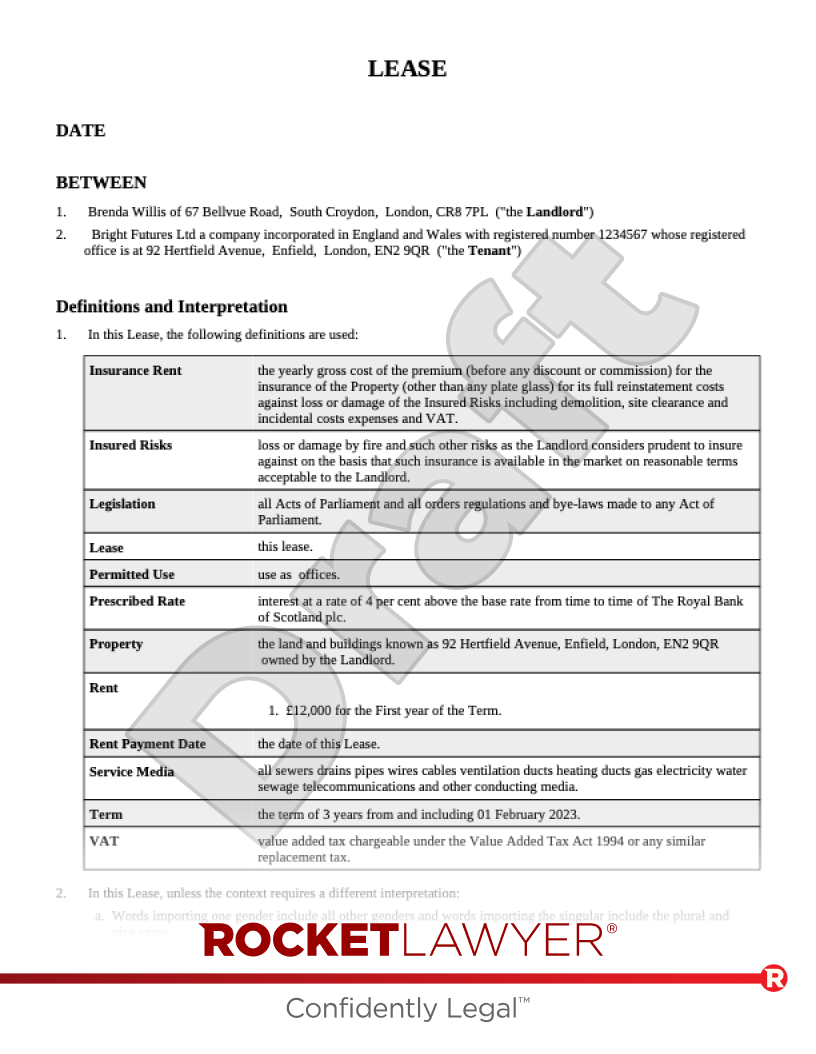During the term of the lease
Surrender
A tenant who wishes to give up possession of a property during the fixed term of a lease can surrender the lease with their landlord by:
-
deed (if the lease was originally created by deed), or
-
conduct, ie delivery of the keys by the tenant and acceptance of them by the landlord
Forfeiture
Forfeiture (the act of forfeiting a lease) allows a landlord to end a fixed-term lease on account of a breach of the lease by the tenant. The landlord may only terminate in this way if:
-
the lease contains a forfeiture clause, and
-
the forfeiture clause allows the landlord to forfeit the lease in respect of the breach
The forfeiture procedure will depend on the nature of the tenant’s breach. If the landlord seeks to forfeit the lease for the tenant’s non-payment of rent, there is generally no need to serve notice on the tenant. For breaches other than non-payment of rent, the landlord will have to serve a Section 146 notice.
In order to effect the forfeiture, the landlord may physically re-enter the property and bring the lease to an end, however, this can only be done if the tenant has clearly vacated the premises. This process is called 'peaceable re-entry'. If the property is still occupied by the tenant, the landlord may bring possession proceedings against the tenant based on a valid forfeiture.
Irritancy (Scotland)
In Scotland, there is a similar process to forfeiture called irritancy. This process allows the landlord to terminate the lease after a breach of the lease by the tenant. The landlord must inform the tenant about the breach in writing and give them reasonable time to remedy the breach; this can be for monetary or non-monetary reasons. In cases of rent arrears, this is a minimum of 14 days. If no remedy is made within the period, the landlord can issue the tenant with a written notice to terminate.
Break clauses
A break clause allows a tenant (and sometimes the landlord) to end a lease before it ends. There are certain requirements that must be followed to ensure the break is valid (eg the tenant must serve upon the landlord a Break notice).
After the lease has expired
Whether you can end a commercial lease on or after the expiration of its term depends on whether or not it is within the scope of certain legislation governing what is called 'security of tenure'. Security of tenure is the right of a tenant of property to occupy it after the lease expires.
If the lease comes within the scope of the legislation (the Landlord and Tenant Act 1954), it will automatically continue after the expiry of the term if the tenant remains in occupation of the property for business purposes. Here, either the landlord or the tenant can terminate the lease by serving one of the statutory notices:
-
section 25 notice - if the landlord wants to terminate the lease. If the landlord can satisfy one of the grounds in Section 30 of the Act, the tenant will not be able to take a new lease. These include breach of repairing obligations and a persistent delay in paying rent
-
section 26 notice - if the tenant wants to terminate the tenancy and request a new one
If the parties opted out of the legislation as a part of the lease, there is no automatic right to security of tenure. In these instances, when a tenant remains in the premises after the expiration of the lease, there is no assumption that the lease has become periodic, even if rent is paid. This means that either party, tenant or landlord, can quit the tenancy with no notice required.
The party wishing to quit the tenancy in these circumstances only needs to inform the other in writing. In the case where a landlord wishes to quit and the tenant refuses, then the landlord will need to commence possession proceedings.
In Scotland, unless the lease is formally terminated by either party by the expiry date, it will continue on for another year (or for the same period as the original lease). This is known as tacit relocation. To end the lease on the expiry date, either party must give at least 40 days' formal written notice.




